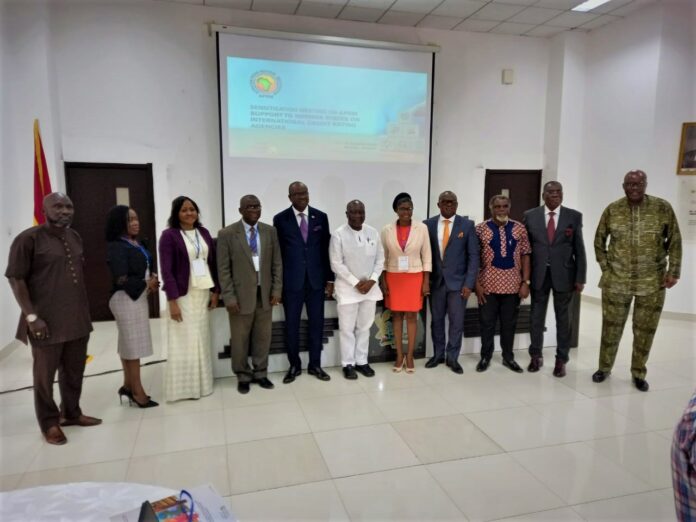William Nana Beeko || Chief Editor, AmaGhana Online
A two-day sensitization workshop on International Credit Rating held last week organised by the African Peer Review Mechanism (APRM) at the Ministry of Foreign Affairs in Accra has brought to the fore, the critical roles of African Journalists in understanding the indicators that go into the credit rating of African economies.
Oftentimes, these International Credit Rating Agencies hide the exact research methods and assessments that go into the credit rating from African governments.
African Journalists who are always in a hurry to break the news first because Moody’s or Standard and Poor’s have spoken and released data do not even bother to assess the data from their own African lenses and perspectives.
The critical role played by the media in informing and educating in this quest cannot be overlooked.
This is why I would like to humbly plead with the African Union and the African Peer Review Mechanism (APRM) to periodically build the capacities of journalists to better understand and come to terms with the realistic economic pictures of prevailing situations.
African governments have suffered unfair credit ratings of their prevailing economic situations by International Credit Agencies which have done more harm than good.
These concerns have been given a hearing by the AU, and significant of all is the good move that Ghana is setting the pace to help establish its own domestic Credit Rating Agencies.
The Ghana Stock Exchange (GSE) is implementing the process of establishing credit rating agencies in Ghana, to rate the issuance of bonds in order to bring some confidence and comfort to investors.
Indeed, this is timely and refreshing considering the challenging times African governments contend with as a result of poor credit ratings by these International Credit Rating Agencies.
As a matter of fact, the African Union championing the agenda for Africa’s own Credit Rating Agencies that will paint a true different picture of the economic situation of African governments is a big initiative to cheer home about in order to boost investor confidence and attraction.
International credit rating agencies wield tremendous power to influence market expectations and investors’ portfolio allocation decisions while their crisis-induced downgrades undermine macroeconomic fundamentals.
Once downgraded, like a self-fulfilling prophecy, even countries with strong macroeconomic fundamentals deteriorate to converge with model-predicted ratings.
Investors, however, respond by raising the cost of borrowing or by withdrawing their capital, aggravating a crisis situation.
The impact of these rating downgrades has been far-reaching and continues to threaten the sustainability of public debt due to high borrowing costs.
Since receiving the mandate to support countries from the AU Assembly, the APRM has achieved significant milestones, including developing a Policy Framework of mechanisms for the provision of support to countries in their engagements with international credit rating agencies.
These mechanisms include; Research and Advisory services, periodic engagements with three international rating agencies, technical and operational support to National Treasuries’ credit rating liaison teams, member states information-sharing and peer-learning platform.
All these are aimed at ensuring that International Credit Rating Agencies employ scientific methods of risk assessment that do not disadvantage African countries.
Recently, the APRM issued a statement and held meetings with Moody’s and Standard & Poor’s following the rating downgrade of the Government of Ghana’s long-term foreign currency sovereign rating in February pointing out the inaccuracies and haste rating decisions by rating agencies.
There is clear evidence that the rating agencies did not pay due attention to neither the rating action nor concerns raised by the Government of Ghana following these rating action.
This, amongst many other issues shows that ‘reforming the work of rating agencies’ is long overdue. Despite appealing against omissions and inaccuracies of key material information driving rating agencies’ decisions, no African country has ever succeeded in this endeavour.
The inadequacies in the regulation has left governments vulnerable to the irresponsible use of power by international credit rating agencies.
As witnessed during the height of the Covid-19 pandemic, many African countries missed the opportunity of participating in the G20 Debt Service Suspension Initiative for fear of being downgraded by the international rating agencies.
A few that participated suffered rating downgrades mainly because rating agencies classify them as defaulters. These developments magnified the impact of the COVID-19 pandemic on African economies, many of which are still suffering severe strain on their fiscal positions.
Other international organisations and regulators, such as The United Nations Human Rights Council raised similar concerns that the assessments of international rating agencies lack human rights considerations, is reducing fiscal space for governments to invest in health services, vaccines, or social protection when it is sorely needed and is making Government’s efforts to contain debt crisis ineffective. This is increasing the suffering of the general population.










































